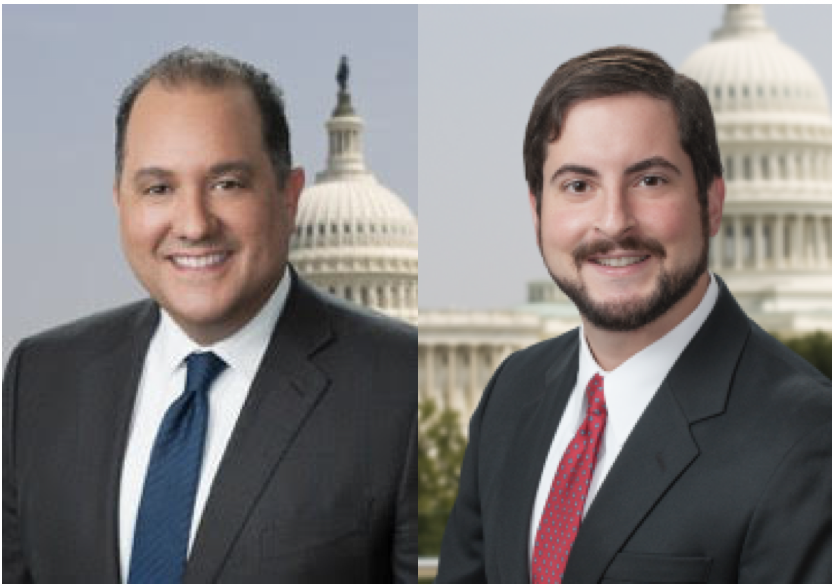On the Docket’s Preview of the March Supreme Court Arguments
March 2 Nasrallah v. Barr No. 18-1432, 11th Cir. Preview by Megan Walden In Nasrallah v. Barr, the Court will resolve a long-standing circuit split in immigration law and determine whether the Court of Appeals has jurisdiction to review findings of fact in denials of withholding and deferral of removal cases. Nidal Khalid Nasrallah, a... Read More
On the Docket’s Preview of the February Supreme Court Arguments
February 24 United States Forest Service v. Cowpasture River Preservation Association; Atlantic Coast Pipeline, LLC v. Cowpasture River Preservation Association No. 18-1584 & 18-1587, 4th Cir. Preview by Taylor Dowd, Senior Online Editor Is the Appalachian Trail, the 2,200-mile-long stretch running from Georgia to Maine, “land,” or just a footpath traversing land? The Appalachian Trail... Read More
On the Docket’s Preview of the January Supreme Court Arguments
January 13 Lucky Brand Dungarees v. Marcel Fashion Group No. 18-1086, 2d Cir. Preview by Michael Fischer, Online Editor Lucky Brand Dungarees and Marcel Fashion group are two competitors within the apparel industry who each own various trademarks using the term “Lucky.” In 2001, Marcel sued Lucky Brand alleging that it violated its “Get Lucky”... Read More
On the Docket’s Preview of the December Supreme Court Arguments
December 2 New York State Rifle and Pistol Association Inc. v. City of New York, New York No. 18-280, 2d Cir. Preview by Michael Fischer, Online Editor In the State of New York, an individual may not possess a firearm without a license. In order to keep a handgun in one’s home, New York citizens... Read More
Exposure as Distortion: Deciphering “Substantial Injury” for FTC Data Security Actions
Maxwell E. Loos · November 2019 87 Geo. Wash. L. Rev. Arguendo 42 If the Equifax breach of 2017 demonstrated anything, it is that consumers in the digital age are mostly powerless to protect their sensitive data from hackers and identity thieves—when companies continue to collect massive amounts of sensitive consumer data while failing to invest... Read More
On the Docket’s Preview of the November Supreme Court Arguments
November 4 Barton v. Barr No. 18-725, 11th Cir. Preview by Nicholas Drews Andre Barton, a citizen of Jamaica, was admitted to the United States in May 1989 and became a lawful permanent resident in 1992. Barton was arrested in January 1996 and convicted of aggravated assault, criminal damage to property, and possession of a... Read More
On the Docket’s Preview of the October Supreme Court Arguments
October 7 Kahler v. Kansas No. 18-6135, Kan. Preview by Michael Fischer, Online Editor In response to several high-profile cases wherein defendants were found not guilty by reason of insanity, the State of Kansas passed legislation in 1995 which effectively abolished the insanity defense for criminal defendants. Thirteen years later, Kraig Kahler was experiencing numerous... Read More
Clerks at 100
Join us Friday, October 4th for a symposium focusing on the institution of Supreme Court clerkships. Essays will be published on the George Washington Law Review’s Arguendo. Find More Information About the Public Portion of the Event Here. Register For the Event Here. *** Private Pre-Panel for GW Law Students, Alumni & Faculty: Clerking at... Read More
A Review of The Cost-Benefit Revolution and Carceral Capitalism
James Hannaway · September 2019 87 Geo. Wash. L. Rev. Arguendo 26 In The Cost-Benefit Revolution, Cass Sunstein celebrates the dominance of cost-benefit analysis in administrative law and imagines new frontiers for its application. While he acknowledges problems associated with cost-benefit analysis like failing to account for unfair distributions of resources or intangible dignitary concerns,... Read More
Did The Supreme Court Just Suppress Speech in the Interest of Protecting The First Amendment? Iancu v. Brunetti
July 18, 2019 Iancu v. Brunetti, 588 U.S. ___ (2019) (Kagan, J.). Response by Roger E. Schechter Geo. Wash. L. Rev. On the Docket (Oct. Term 2018) Slip Opinion | SCOTUSblog Did The Supreme Court Just Suppress Speech in the Interest of Protecting The First Amendment? Iancu v. Brunetti In Matal v. Tam,1 the Supreme... Read More
What’s Past is Prologue: The Importance of History in Flowers v. Mississippi
July 10, 2019 Flowers v. Mississippi, 588 U.S. ___ (2019) (Kavanaugh, J.). Response by Robin M. Maher Geo. Wash. L. Rev. On the Docket (Oct. Term 2018) Slip Opinion | SCOTUSblog What’s Past is Prologue: The Importance of History in Flowers v. Mississippi Few methods employed for the purpose of excluding African Americans from jury... Read More
North Carolina Department of Revenue v. Kaestner 1992 Family Trust: No Tax Due, But No Path for the Next Cases
July 8, 2019 North Carolina Department of Revenue v. Kaestner 1992 Family Trust, 588 U.S. ___ (2019) (Sotomayor, J.). Response by Alan B. Morrison Geo. Wash. L. Rev. On the Docket (Oct. Term 2018) Slip Opinion | SCOTUSblog North Carolina Department of Revenue v. Kaestner 1992 Family Trust: No Tax Due, But No Path for... Read More
Kisor v. Wilkie: A Reprieve for Embattled Administrative State?
July 3, 2019 Kisor v. Wilkie, 587 U.S. ___ (2019) (Kagan, J.). Response by Robert L. Glicksman Geo. Wash. L. Rev. On the Docket (Oct. Term 2018) Slip Opinion | SCOTUSblog Kisor v. Wilkie: A Reprieve for Embattled Administrative State? Imagine a world in which administrative agencies whose actions are challenged in court are afforded... Read More
Tennessee Wine & Spirits Retailers Ass’n v. Thomas: Local Protectionism Loses Out
July 2, 2019 Tennessee Wine & Spirits Retailers Association v. Thomas, 588 U.S. ___ (2019) (Alito, J.). Response by Alan B. Morrison Geo. Wash. L. Rev. On the Docket (Oct. Term 2018) Slip Opinion | SCOTUSblog Tennessee Wine & Spirits Retailers Ass’n v. Thomas: Local Protectionism Loses Out Tennessee has very restrictive statutes on obtaining... Read More
The Bladensburg Cross Decision – A Twisted Cross and the Remaking of Establishment Clause Standards
July 1, 2019 The American Legion v. American Humanist Association, 588 U.S. ___ (2019) (Alito, J.). Response by Ira C. Lupu & Robert W. Tuttle Geo. Wash. L. Rev. On the Docket (Oct. Term 2018) Slip Opinion | SCOTUSblog The Bladensburg Cross Decision – A Twisted Cross and the Remaking of Establishment Clause Standards (On... Read More
Herrera v. Wyoming: A New Trend for Indian Law?
June 11, 2019 Herrera v. Wyoming, 587 U.S. ___ (2019) (Sotomayor, J.). Response by Monte Mills Geo. Wash. L. Rev. On the Docket (Oct. Term 2018) Slip Opinion | SCOTUSblog Herrera v. Wyoming: A New Trend for Indian Law? On May 20, 2019, the United States Supreme Court, by a 5–4 decision in Herrera v. Wyoming,... Read More
When Is a Defendant Not a Defendant? Home Depot U.S.A, Inc. v. Jackson
June 11, 2019 Home Depot U.S.A., Inc. v. Jackson, 587 U.S. ___ (2019) (Thomas, J.). Response by Alan B. Morrison Geo. Wash. L. Rev. On the Docket (Oct. Term 2018) Slip Opinion | SCOTUSblog When Is a Defendant Not a Defendant? Home Depot U.S.A., Inc. v. Jackson Some cases, like the travel ban or the census... Read More
Franchise Tax Board v. Hyatt: An Unnecessary Overruling
May 21, 2019 Franchise Tax Board v. Hyatt, 587 U.S. ___ (2019) (Thomas, J.). Response by Alan B. Morrison Geo. Wash. L. Rev. On the Docket (Oct. Term 2018) Slip Opinion | SCOTUSblog Franchise Tax Board v. Hyatt: An Unnecessary Overruling In Franchise Tax Board of California v. Hyatt1, the Court, by a vote of 5–4,... Read More
Is Transmission of Electricity a “Governmental Function?” Thacker v. Tennessee Valley Authority
May 10, 2019 Thacker v. Tennessee Valley Authority, 587 U.S. ___ (2019) (Kagan, J.). Response by Richard J. Pierce, Jr. Geo. Wash. L. Rev. On the Docket (Oct. Term 2018) Slip Opinion | SCOTUSblog Is Transmission of Electricity a “Governmental Function?” Thacker v. Tennessee Valley Authority The Court concludes its unanimous opinion in Thacker v. Tennessee... Read More
Is the Court Encouraging Agencies to Rely on Junk Science? Biestek v. Berryhill
April 23, 2019 Biestek v. Berryhill, 587 U.S. ___ (2019) (Kagan, J.). Response by Richard J. Pierce, Jr. Geo. Wash. L. Rev. On the Docket (Oct. Term 2018) Slip Opinion | SCOTUSblog Is the Court Encouraging Agencies to Rely on Junk Science? Biestek v. Berryhill It would be easy to interpret the six-Justice majority opinion in... Read More
Bucklew v. Precythe: The Supreme Court’s Tortured Death Penalty Jurisprudence
April 17, 2019 Bucklew v. Precythe, 587 U.S. ___ (2019) (Gorsuch, J.). Response by John D. Bessler Geo. Wash. L. Rev. On the Docket (Oct. Term 2018) Slip Opinion | SCOTUSblog Bucklew v. Precythe: The Supreme Court’s Tortured Death Penalty Jurisprudence In Bucklew v. Precythe,1 the U.S. Supreme Court rejected a death row inmate’s as-applied challenge... Read More
Crossing the River: Lorenzo v. Securities and Exchange Commission
April 2, 2019 Lorenzo v. SEC, 586 U.S. ___ (2019) (Breyer, J.). Response by Theresa A. Gabaldon Geo. Wash. L. Rev. On the Docket (Oct. Term 2018) Slip Opinion | SCOTUSblog Crossing the River: Lorenzo v. Securities and Exchange Commission Section 17(a)(1) of the Securities Act of 1933 provides that it is “unlawful for any... Read More
Defining “the”: In Nielsen v. Preap the Court relies on language arts to justify detention of immigrants
April 1, 2019 Nielsen v. Preap, 586 U.S. ___ (2019) (Alito, J.). Response by Cori Alonso-Yoder Geo. Wash. L. Rev. On the Docket (Oct. Term 2018) Slip Opinion | SCOTUSblog Defining “the”: In Nielsen v. Preap the Court relies on language arts to justify detention of immigrants What does “when” mean? Is it evident what... Read More
On the Docket’s Preview of the March Supreme Court Arguments
March 18 Virginia House of Delegates v. Bethune Hill No. 18-281, E.D. Va. Preview by Sean Lowry, Online Editor* In Virginia House, the Court will re-examine a Virginia state electoral map for racial gerrymandering claims and hear new arguments about who has the standing to defend the map on appeal. The initial controversy arose when voters... Read More
What If the World Bank Financed Human Rights Violations: Jam v. International Finance Corporation
March 11, 2019 Jam v. International Finance Corporation, 586 U.S. ___ (2019) (Roberts, C.J.). Response by Ralph G. Steinhardt Geo. Wash. L. Rev. On the Docket (Oct. Term 2018) Slip Opinion | SCOTUSblog What If the World Bank Financed Human Rights Violations: Jam v. International Finance Corporation At first glance, the Supreme Court’s 7–1 decision... Read More
What Timbs Does Not Say
March 7, 2019 Timbs v. Indiana, 586 U.S. ___ (2019) (Ginsburg, J.). Response by Suja A. Thomas Geo. Wash. L. Rev. On the Docket (Oct. Term 2018) Slip Opinion | SCOTUSblog What Timbs Does Not Say Timbs v. Indiana1 isn’t a surprising case. Over time, the United States Supreme Court successively has decided that different... Read More
On the Docket’s Preview of the February Supreme Court Arguments
February 19 Return Mail, Inc. v. United States Postal Service No. 17-1594, Fed. Cir. Preview by Michelle Divelbiss, Online Editor It has been almost a decade since the Supreme Court decided that corporations are people, and now the Court looks to whether the government is a “person.” Under the Leahy-Smith America Invents Act (“AIA”), patent... Read More
Hearsay in the Modern Age: Balancing Practicality and Reliability by Amending Federal Rule of Evidence 801(d)(1)(A)
Madeline Smedley 87 Geo. Wash. L. Rev. 207 The Advisory Committee on the Federal Rules of Evidence is considering amending Federal Rule of Evidence 801(d)(1)(A) to make prior inconsistent statements captured on audiovisual devices admissible for their substantive value rather than solely for impeachment purposes. Although this proposed change allows litigants to leverage the benefits of digital technology, the proposal lacks the... Read More
The First American Climate Refugees and the Need for Proactive Relocation
Kelley Pettus 87 Geo. Wash. L. Rev. 172 American disaster response under the Stafford Act currently provides only reactive responses to natural and man-made disasters, offering assistance to states under major disaster or emergency declarations once harm has occurred. In the age of climate change, where future disasters are accurately predictable and resulting harm is preventable, the United States should adopt... Read More
Biological Citizenship and the Children of Same-Sex Marriage
Michael J. Higdon 87 Geo. Wash. L. Rev. 124 In 2015, the Supreme Court ruled that states could not, consistent with the Due Process Clause, deny same-sex couples the right to marry. To allow otherwise, said the Court, would “harm and humiliate the children of same-sex couples.” Thus, it was hoped that marriage equality would provide greater security for the children... Read More
Sexual Harassment and Solidarity
Marion Crain & Ken Matheny 87 Geo. Wash. L. Rev. 56 In the waning months of 2017, Americans endured an almost daily barrage of news reports describing sexual harassment by powerful men in entertainment, media, politics, and law. The media focus continued in 2018 as reactions proliferated, ranging from walkouts at Google by workers protesting the company’s handling of sexual-misconduct allegations... Read More
A Rule of Persons, Not Machines: The Limits of Legal Automation
Frank Pasquale 87 Geo. Wash. L. Rev. 1 For many legal futurists, attorneys’ work is a prime target for automation. They view the legal practice of most businesses as algorithmic: data (such as facts) are transformed into outputs (agreements or litigation stances) via application of set rules (the law). These technophiles promote substituting computer code for contracts and descriptions of facts... Read More
On the Docket’s Preview of the January Supreme Court Arguments
January 7 Merck Sharpe & Dohme Corp. v. Albrecht No. 17-290, 3d Cir. Preview by Samuel E. Meredith, Senior Online Editor Merck was initiated by over 500 people who used an osteoporosis medication known as Fosamax. The plaintiffs claim that Fosamax caused them to experience “an atypical femoral fracture,” and that the drug manufacturer did not... Read More
On the Docket’s Preview of the December Supreme Court Arguments
December 3 Dawson v. Steager No. 17-419, W. Va. Preview by Samuel E. Meredith, Senior Online Editor West Virginia does not collect tax on some kinds of retirement benefits given to former state law enforcement officials. The state does not, however, extend this same tax relief to retired federal law enforcement personnel. The question presented by... Read More
On the Docket’s Preview of the November Supreme Court Arguments
November 5 Sturgeon v. Frost No. 17-949, 9th Cir. Preview by Clay Wild At issue in this case is whether the Alaska National Interest Lands Conservation Act (“ANILCA”) prohibits the National Park Service (“NPS”) from regulating State, Native Corporation, and private land located within the National Park System in Alaska. In 2007, NPS rangers found... Read More
“Good Cause” Is Cause for Concern
James Yates 86 Geo. Wash. L. Rev. 1438 The Administrative Procedure Act (“APA”) generally requires that all federal administrative rules undergo public “notice and comment.” The “good cause” exception allows an agency to bypass this requirement where it would be “impracticable, unnecessary, or contrary to the public interest.” In recent years, good cause has been increasingly used to excuse “major” rules,... Read More
Chartering Fintech: The OCC’s Newest Nonbank Proposal
Elizabeth J. Upton 86 Geo. Wash. L. Rev. 1392 The Office of the Comptroller of the Currency is responsible for ensuring federally chartered banks’ safety and soundness, compliance with federal banking laws, and compliance with federal laws regarding fair access to financial services and fair treatment of customers. The states have historically overseen and regulated nonbank companies, including nonbank financial services providers... Read More
Use of the Congressional Review Act at the Start of the Trump Administration: A Study of Two Vetoes
Stephen Santulli 86 Geo. Wash. L. Rev. 1373 Once regarded as a legislative dead letter, the Congressional Review Act (“CRA”) gained new vitality in 2017 as President Trump and Republicans in Congress used the Act to veto more than a dozen regulations issued late in the Obama Administration. The reemergence of the CRA renewed debate over a vague provision at the... Read More
Lying in Wait: How a Court Should Handle the First Pretextual For-Cause Removal
Richard Rothman & Katelin Shugart-Schmidt 86 Geo. Wash. L. Rev. 1348 The legal limits of for-cause removal protections for executive officials have barely been defined, even as the current presidential administration considers removing protected officials. Open questions include whether and how courts will choose to define “cause,” as well as whether courts will inquire into the authenticity of a President’s stated... Read More
Defying Debarment: Judicial Review of Agency Suspension and Debarment Actions
Samantha Block 86 Geo. Wash. L. Rev. 1316 Judicial review of agencies’ suspension and debarment decisions is currently in flux. Recently, courts are more closely scrutinizing such decisions, potentially altering the way these tools are used. Both Congress and the courts need to consider creating a clear and consistent standard for agency review of suspension and debarment actions. To illuminate the... Read More
Topic Modeling the President: Conventional and Computational Methods
J.B. Ruhl, John Nay & Jonathan Gilligan 86 Geo. Wash. L. Rev. 1243 Law is generally embodied in text, and lawyers have for centuries classified large bodies of legal text into distinct topics—that is, they “topic model” the law. But large bodies of legal documents present challenges for conventional topic modeling methods. The task of gathering, reviewing, coding, sorting, and assessing... Read More
Optimal Ossification
Aaron L. Nielson 86 Geo. Wash. L. Rev. 1209 One of the dirtiest words in administrative law is “ossification”—the term used for the notion that procedural requirements force agencies to spend a long time on rulemakings. Ossification, however, is misunderstood. Even leaving aside the other benefits of procedures, delay itself can be valuable. For instance, procedural delay... Read More
The American Nondelegation Doctrine
Cass R. Sunstein 86 Geo. Wash. L. Rev. 1181 An American nondelegation doctrine is flourishing. Contrary to the standard account, it does not forbid Congress from granting broad discretion to executive agencies. Instead it is far narrower and more targeted. It says, very simply, that executive agencies cannot make certain kinds of decisions unless Congress has explicitly authorized them to do... Read More
On the Docket’s Preview of the October Supreme Court Arguments
The Supreme Court has dominated the news cycle lately, and yet none of it has had anything to do with the Court’s jurisprudence. Instead, all the attention has been focused on Judge Brett Kavanaugh, whose confirmation prospects have diminished in the wake of allegations of sexual misconduct. Following a set of extremely contentious hearings, some... Read More
Drone Trespass and the Line Separating the National Airspace and Private Property
Lane Page 86 Geo. Wash. L. Rev. 1152 On August 29, 2016, the Federal Aviation Administration (“FAA”) released a small-drone rule that will substantially increase the number of commercial drones flying throughout the national airspace. This new rule fails to specifically regulate or define when a drone is trespassing over a landowner’s private property. Moreover, since the development of drone technology,... Read More
Before the Breach: The Role of Cyber Insurance in Incentivizing Data Security
Brendan Heath 86 Geo. Wash. L. Rev. 1115 Data breaches continue to increase in size, scope, and consequence as companies face the prospect of millions of personal records of their customers or clients being disclosed to internet hackers. In the face of this growing risk, insurance policies explicitly written to cover cyber incidents offer benefits to society in the form of... Read More
Digital Data and Patents at the International Trade Commission: A Path Forward After ClearCorrect
Jill Greenfield 86 Geo. Wash. L. Rev. 1079 With the rise of 3D printing and the digitization of things, consumers are now able to replicate patented goods in their own homes using design files that are both widely available and easily shared. Society is on the brink of a new digital revolution, and patent holders are about to encounter the... Read More
FBI Independence as a Threat to Civil Liberties: An Analogy to Civilian Control of the Military
Justin Walker 86 Geo. Wash. L. Rev. 1011 At a time when the President is under investigation, and in the wake of a controversial dismissal of the FBI Director, the need for an “independent” FBI has appeared to many to be more important than ever. Indeed, the Senate would not have confirmed the new FBI Director, Christopher Wray, if he... Read More
The Trespass/Nuisance Divide and the Law of Easements
Kenneth A. Stahl 86 Geo. Wash. L. Rev. 966 The law of easements is a mess. In one case, a property owner ends up with a landlocked parcel because, although he had a desperate need to traverse his neighbor’s land to access a public road, the necessity did not arise from the severance of a unified parcel. In another, a... Read More
Franchise Regulation for the Fissured Economy
Andrew Elmore 86 Geo. Wash. L. Rev. 907 Franchise stores employ nearly nine million people in the United States. Many franchisors, which own trademarks that they license to franchisees, are among the largest, most sophisticated corporations in the United States. Yet franchise store employees are often paid below the minimum wage and frequently report unsafe workplaces and workplace discrimination. The thesis... Read More
Trump v. Hawaii: Bait and Switch–The Supreme Court’s Travel Ban Decision and Korematsu
July 15, 2018 Trump v. Hawaii, 585 U.S. ___ (2018) (Roberts, C.J.). Response by Anita Sinha Geo. Wash. L. Rev. On the Docket (Oct. Term 2017) Slip Opinion | CNBC | SCOTUSblog Trump v. Hawaii: Bait and Switch–The Supreme Court’s Travel Ban Decision and Korematsu In the 5–4 Trump v. Hawaii1 decision, the U.S. Supreme... Read More
Lucia v. SEC
July 3, 2018 Lucia v. SEC, 585 U.S. ___ (2018) (Kagan, J.). Response by Richard J. Pierce, Jr. Geo. Wash. L. Rev. On the Docket (Oct. Term 2017) Slip Opinion | SCOTUSblog Lucia v. SEC The only issue in Lucia v. SEC1 was whether Securities and Exchange Commission (“SEC”) Administrative Law Judges (“ALJs”) are employees or... Read More
Carpenter v. United States: Big Data is Different
July 2, 2018 Carpenter v. United States, 585 U.S. ___ (2018) (Roberts, C.J.). Response by Margot E. Kaminski Geo. Wash. L. Rev. On the Docket (Oct. Term 2017) Slip Opinion | SCOTUSblog Carpenter v. United States: Big Data Is Different A central truism of U.S. privacy law is that if you share information, you do not... Read More
Why Art Does Not Need Copyright
Amy Adler 86 Geo. Wash. L. Rev. 313 This Article explores the escalating battles between visual art and copyright law in order to upend the most basic assumptions on which copyright protection for visual art is grounded. It is a foundational premise of intellectual property law that copyright is necessary for the “progress” of the arts. This Article demonstrates that this... Read More
The Myth of Free
John M. Newman 86 Geo. Wash. L. Rev. 513 Myths matter. This Article is the first to confront a powerful myth that pervades modern economic, technological, and legal discourse: the Myth of Free. The prevailing view is that consumers capture massive welfare surplus from a flood of innovative new products that are offered free of charge. Economists, legal scholars, and industry... Read More
What Happens Behind Bars Should Not Stay Behind Bars: The Case for an Exhaustion Exception to the Prison Litigation Reform Act for Juveniles
Samantha Bennett 86 Geo. Wash. L. Rev. 587 Congress enacted the Prison Litigation Reform Act (“PLRA”) in an effort to reduce the number of frivolous lawsuits brought by prisoners. As a result of some of its provisions, however—in particular, the exhaustion provision—nonfrivolous suits are effectively blocked from reaching the courts, enabling grave injustices to persist in America’s prison facilities without... Read More
A Dangerous Custom: Reining in the Use of Signature Strikes Outside Recognized Conflicts
Amy Byrne 86 Geo. Wash. L. Rev. 620 It is well known that the U.S. Government has actively used drone strikes to target enemies abroad for years. The struggle between the powers of the President to provide security to our nation and the external restrictions imposed on those powers, however, is lesser known. For example, the Constitution grants Congress alone the... Read More
Bifurcating Settlements
Michael Abramowicz & Sarah Abramowicz 86 Geo. Wash. L. Rev. 376 In settling a lawsuit, parties agree on their obligations to one another, but they need not separately address each issue, claim, or remedy that a trial court would have confronted. The legal system, however, can bifurcate the settlement process, requiring separate resolution of components of a settlement. Bifurcation can protect... Read More
Tiered Constitutional Design
Rosalind Dixon & David Landau 86 Geo. Wash. L. Rev. 438 Scholarship has posited two models of constitutionalism. One is short, abstract, and rigid, like the United States Constitution. The other is lengthy, detailed, and flexible, like the constitutions found in many U.S. states and in many other countries around the world. This Article argues that there is a descriptively common... Read More
“Some Kind of Notice” Is No Kind of Standard: The Need for Judicial Intervention and Clarity in Due Process Protections for Public School Students
Elizabeth J. Upton 86 Geo. Wash. L. Rev. 655 Public backlash over zero tolerance policies that funnel public school students to jail through the “school to prison pipeline” has unveiled the systemic issues associated with discriminatory application and the detrimental effects of exclusionary discipline. What remains unaddressed and largely ignored is the lack of procedural safeguards afforded to students who face... Read More
South Dakota v. Wayfair, Inc.: Will It End a Seemingly Endless Debate?
June 27, 2018 South Dakota v. Wayfair, Inc., 585 U.S. ___ (2018) (Kennedy, J.). Response by David Brunori Geo. Wash. L. Rev. On the Docket (Oct. Term 2017) Slip Opinion | The New York Times | SCOTUSblog South Dakota v. Wayfair, Inc.: Will It End a Seemingly Endless Debate? Do you ever wonder why sometimes... Read More
Gill v. Whitford & Benisek v. Lamone: Some Good News and Some Bad
June. 24, 2018 Gill v. Whitford, 585 U.S. ___ (2018) (Roberts, C.J.). Slip Opinion | SCOTUSblog Benisek v. Lamone, 585 U.S. ___ (2018) (per curiam). Slip Opinion | SCOTUSblog Response by Alan B. Morrison Geo. Wash. L. Rev. On the Docket (Oct. Term 2017) Gill v. Whitford & Benisek v. Lamone: Some Good News and... Read More
Animal Science Products, Inc. v. Hebei Welcome Pharmaceutical Co.: Respect but Verify: Foreign Government Statements of Foreign Law Do Not Get Conclusive Deference
June. 21, 2018 Animal Science Products, Inc. v. Hebei Welcome Pharmaceutical Co., 585 U.S. ___ (2018) (Ginsburg, J.). Response by Donald C. Clarke Geo. Wash. L. Rev. On the Docket (Oct. Term 2017) Slip Opinion | SCOTUSblog Animal Science Products, Inc. v. Hebei Welcome Pharmaceutical Co.: Respect but Verify: Foreign Government Statements of Foreign Law... Read More
China Agritech, Inc. v. Resh: For Whom the Class Tolls—It Tolls for Individual Claims
June 15, 2018 China Agritech, Inc. v. Resh, 584 U.S. ___ (2018) (Ginsburg, J.). Response by James Hannaway Geo. Wash. L. Rev. On the Docket (Oct. Term 2017) Slip Opinion | SCOTUSblog China Agritech, Inc. v. Resh: For Whom the Class Tolls—It Tolls for Individual Claims On June 11, 2018, in China Agritech, Inc. v. Resh,1... Read More
Masterpiece Cakeshop, Ltd. v. Colorado Civil Rights Commission: A Troublesome Application of Free Exercise Principles by a Court Determined to Avoid Hard Questions
June 7, 2018 Masterpiece Cakeshop, Ltd. v. Colo. Civil Rights Comm’n, 584 U.S. ___ (2018) (Kennedy, J.). Response by Ira C. Lupu & Robert W. Tuttle Geo. Wash. L. Rev. On the Docket (Oct. Term 2017) Slip Opinion | SCOTUSblog Masterpiece Cakeshop, Ltd. v. Colorado Civil Rights Commission: A Troublesome Application of Free Exercise Principles... Read More
Epic Systems Corp. v. Lewis: Class Action Waivers—Employees Predictably Lose
June 6, 2018 Epic Systems Corp. v. Lewis, 584 U.S. ___ (2018) (Gorsuch, J.). Response by Michael Selmi Geo. Wash. L. Rev. On the Docket (Oct. Term 2017) Slip Opinion | SCOTUSblog Epic Systems Corp. v. Lewis: Class Action Waivers—Employees Predictably Lose It came as no surprise when the Supreme Court, in a 5–4 decision, upheld... Read More
Murphy v. NCAA: New Jersey Wins Big After Betting on Unconstitutionality of Federal Sports-Betting Ban
May 30, 2018 Murphy v. NCAA, 584 U.S. ___ (2018) (Alito, J.). Response by Jeff Ifrah & David Yellin Geo. Wash. L. Rev. On the Docket (Oct. Term 2017) Slip Opinion | New York Times | SCOTUSblog Murphy v. NCAA: New Jersey Wins Big After Betting on Unconstitutionality of Federal Sports-Betting Ban In a recent 6–3... Read More
McCoy v. Louisiana: New Challenges for Defenders, New Risks for the Mentally Ill
May. 23, 2018 McCoy v. Louisiana, 584 U.S. ___ (2018) (Ginsburg, J.). Response by Robin M. Maher Geo. Wash. L. Rev. On the Docket (Oct. Term 2017) Slip Opinion | SCOTUSblog McCoy v. Louisiana: New Challenges for Defenders, New Risks for the Mentally Ill In Florida v. Nixon,1 Justice Ginsburg wrote for a unanimous Supreme... Read More
SAS Institute Inc. v. Iancu: The Statute is Hereby Clear
May 7, 2018 SAS Institute Inc. v. Iancu, 584 U.S. ___ (2018) (Gorsuch, J.). Response by Andrew C. Michaels Geo. Wash. L. Rev. On the Docket (Oct. Term 2017) Slip Opinion | SCOTUSblog SAS Institute Inc. v. Iancu: The Statute is Hereby Clear Before the Law stands a doorkeeper . . . . From hall to hall there is... Read More
Murphy v. Smith: Limiting Access to Counsel for Prisoners
Apr. 2, 2018 Murphy v. Smith, 138 S. Ct. 784 (2018) (Gorsuch, J.). Response by Katy Ramsey Geo. Wash. L. Rev. On the Docket (Oct. Term 2017) Slip Opinion | SCOTUSblog Murphy v. Smith: Limiting Access to Counsel for Prisoners On February 21, 2018, the U.S. Supreme Court decided Murphy v. Smith,1 which hinged on the... Read More
On the Docket’s Preview of the March Supreme Court Arguments
The first oral arguments for the month of March will commence when the Court convenes this coming Monday. Since our last set of argument previews was released, the Court has issued opinions in nine different cases, including a consequential ruling in Jennings v. Rodriguez. The Court’s March schedule will undoubtedly generate momentous decisions as well, as... Read More
Artificial Authorship and Judicial Opinions
Richard M. Re 92 Geo. Wash. L. Rev. 1558 Generative Artificial Intelligence (“AI”) is already beginning to alter legal practice. If optimistic forecasts prove warranted, how might this technology transform judicial opinions—a genre often viewed as central to the law? This Symposium Essay attempts to answer that predictive question, which sheds light on present realities.... Read More
AI Regulation Has Its Own Alignment Problem: The Technical and Institutional Feasibility of Disclosure, Registration, Licensing, and Auditing
Neel Guha, Christie M. Lawrence, Lindsey A. Gailmard, Kit T. Rodolfa, Faiz Surani, Rishi Bommasani, Inioluwa Deborah Raji, Mariano-Florentino Cuéllar, Colleen Honigsberg, Percy Liang & Daniel E. Ho 92 Geo. Wash. L. Rev. 1473 Calls for regulating artificial intelligence (“AI”) are widespread, but there remains little consensus on both the specific harms that regulation can... Read More
The Automated State: A Realist View
David Freeman Engstrom 92 Geo. Wash. L. Rev. 1437 Government use of artificial intelligence (“AI”) to make, implement, and enforce law is fueling anxieties among a growing cast of critics. Some are accelerations of concerns raised by other technology adoptions: error, bias, gaming, and the oversight challenges that come with reliance on procurement. Others are... Read More
Major Technological Questions
Michael Abramowicz & John F. Duffy 92 Geo. Wash. L. Rev. 1391 A defining feature of the past two and a half centuries has been the extraordinary and unprecedented velocity of technological change. The rush of new technologies has affected every area of society including the law. Legal systems, even while promoting technological progress through... Read More
Law’s Detrimental Reliance on Intermediaries
Carla L. Reyes 92 Geo. Wash. L. Rev. 1343 Emerging technology is law’s magic mirror. Even as law seeks to cabin the effects of emerging technology in society, when we hold emerging technology up to law, emerging technology often provides opportunity for reflection that reveals flaws or gaps in legal constructs. Of course, rather than... Read More
Decentralized Markets and Self-Regulation
Yuliya Guseva 92 Geo. Wash. L. Rev. 1281 Distributed ledger technology, such as blockchains, is changing financial markets by creating a new foundation for transacting with digital assets. Simultaneously, major blockchain-enabled intermediaries—crypto-exchanges—have emerged to trade, broker, and settle transactions with digital assets. U.S. regulators seek to place crypto exchanges within the ambit of existing regulation... Read More
Blockchain Technology and the Rule of Code: Regulation via Governance
Primavera De Filippi, Morshed Mannan & Wessel Reijers 92 Geo. Wash. L. Rev. 1229 Blockchain-based systems, by virtue of their technological features, present challenges to the rule of law. These systems work in a transnational and decentralized fashion, often with pseudonymous user identities, executing code autonomously without the possibility of coercion by any single operator.... Read More
Artificial Intelligence and the First Amendment
Cass R. Sunstein 92 Geo. Wash. L. Rev. 1207 Artificial intelligence (“AI”), including generative AI, is not human, but restrictions on the activity or use of AI, or on the dissemination of material by or from AI, might raise serious First Amendment issues if those restrictions (1) apply to or affect human speakers and writers,... Read More
The Mathematical Question: Defining “Relatively Easy” Political Questions
Nathaniel Schwamm 92 Geo. Wash. L. Rev. 1182 Justiciability doctrines are intertwined with constitutional commands and prudential concerns. They weave together text and history; they aim to protect democracy and individual rights. In 2019, the Supreme Court, in Rucho v. Common Cause, determined that partisan gerrymandering claims suffer from justiciability problems by implicating a doctrinal... Read More
Judicial Review of Agency Noncompliance with Presidential Administrative Orders and OMB Circular A-4
Eitan Sirkovich 92 Geo. Wash. L. Rev. 1163 President Biden’s Executive Order 14,094, Modernizing Regulatory Review, continues the line of presidential directives dating back to the Reagan Administration that centralize the President’s control over administrative agencies’ regulatory processes. Its express purpose is to ensure well-reasoned, high-quality regulations, but it affords no private right of action... Read More





















